How THE Parallel Non-Monetary Economy Is created – (paid for with labour).
Potential realisation:
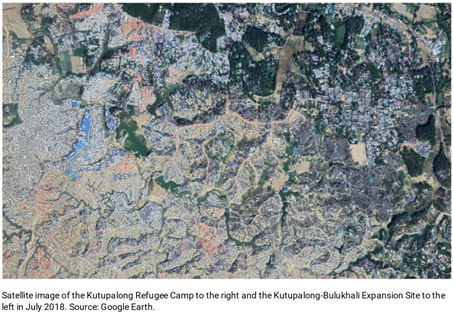
“I am a refugee living in Kutupalong refugee camp, Bangladesh. I am 15 years old and lost my parents and home. A representative of our camp said it has adopted The Parallel Non-Monetary Economy (PNME). She told me the time I spend finding water, food, caring for my cleanliness and sanitation and helping my family and others in the camp – has been assigned some virtual figures in an individual non-monetary account like a bank account. It is called a ‘Universal Basic Income’ based on statistics the camp has agreed upon regarding the amount and nature of the work my daily life entails, (it also includes a measure of rest). If I decide to use more time in education, or employment, that is also measured and creates additional income. All other individuals and businesses have these non-monetary accounts (alongside monetary ones) and when I transfer numerals from mine to theirs it can purchase services or goods to the level of numerals society has agreed upon. This is not money and has no material value, so I cannot exchange my units for anything else. I can only use them in PNME accounts. The goods are exchanged simply through the non-monetary units kept on a cloud storage system. So, now, I do not need money or anything to do this with. I only have to press a scanner with my thumb and immediately the numbers are created or transferred! Many suppliers are now moving in to the camp and we do not need to rely on NGOs. I can now choose what I want to eat, clean and clothe my family, and myself, and my aunt can get her medical supplies. Even my younger sister age 7 earns from her activities. I thanked the representative but she said it wasn’t her or anyone else giving it to me, I was already earning it from the moment they adopted the PNME, it is mine. I asked where it came from and she said nowhere – my daily work made it.”
This Parallel Non-Monetary Economy is not merely for refugees. It is a system that can be applicable to all, indiscriminately, as an immediate solution to economic disparity, so we can collectively take back control of the global economy and our individual choices and future.
Formative steps:
1 – form a decent size collective that can dictate terms of a market or supplier; OR use EXISTING organisations – NGOs, charities, aid & campaign networks.
2 – agree the terms and standards that suppliers have to meet.
3 – agree what forms of activity (constituting work / labour) are
rewarded by PNME units.
4 – agree what tiered rates of numerical units are earned for what incentives and prioritised work (sanitation, food production, health care, individual career choice, education, creative work, conservation to brain surgery etc). Also, set a Universal Basic Income / Living Wage (base-rate that removes cost burden of those less able to work and as an individual human right for home / familial / self-care etc). The units only have virtual numerical significance for the sake of transaction, not value, and can incentivise less attractive and/or essential work by paying more than money can, requiring less hours to be spent doing that work. All labour will be cost-free to employers, so it will accommodate beyond-optimum employment, as earnings are self-generated and do not deduct from existing budgets. Also, formal employment can attract a small premium as an incentive for employers choosing PNME workers.
5 – agree what those units can exchange for (compared with the monetary market in a fictional sense, not as value or an equivalent, it should always outperform money but can reflect scarcity or specialization).
(In any circular economy, all participants would agree the medium and its value – even if trading with used matchsticks).
Once a decent collective have formed, they hold economic power. They choose what form the non-monetary economy will take and what rates are applied to various types of labour, or they can set a rate for all labour. This is best if it is done with international accord, for there to be one universal PNME requiring no exchange calculations, but it can accommodate unilateral systems without exchange rates, (if one is aware how that system differs affecting choices in different localities) – so various PNMEs might exist but remain usable to anyone in that static location; (this is less desirable as it mirrors the monetary system of differing currency values globally). Since the PNME is not a cost and is a benefit to the economy, it avoids many injustices and economic impositions if it does not alter from location to location,. This is one superior quality and universality above money, affecting the artificial manipulation of price rates.
6 – agree an accounting system that is de-centralised, regulated and reported (if necessary) by part of global society on rotational or random basis.
7 – set up measuring mechanisms (these are best if they are automatic and do not require hands on maintenance and policing).
Many are sceptical of surveillance technology and tracking, (Big Brother) but most people globally already condone it from government and corporate imposition and even with their valuables, private details and wealth, through apps created by companies like Google, Apple and Microsoft. Once you have the PNME collective with immediate and rapid accumulating wealth, it is entirely possible an existing company, or a purpose formed company, can create the necessary system for collating all individual PNME income, through open-source technology. Some suggest civic states and community or cooperative banking, but all monitoring must be INDISCRIMINATE; so, already successful blockchain and other accepted forms of technical tracking along with statistical demographics for basic needs is preferable – regulated by a global random consensus, which means it is secure and not easily abused / misdirected. We are all used to payments made through card transaction, but there is something better at our disposal when we trust its regulation is for civic benefit, not commercial manipulation. Use of this technology means nothing material need be carried for transaction purposes and any monitoring receiver – like a watch, phone, fob, bracelet or pendant – does not lose individual monitoring data if it is lost or damaged; (stealing someone’s equipment would be futile as it basically only registers individual bio-metrics and isn’t used in trading). People in the worst circumstances could immediately afford to acquire such a unit, or statistics applied for such circumstances would eliminate this need.
HOW WILL THE PNME FUNCTION? (please see Illustrations).
Generating income:
1 – Blockchain technology already automates income successfully (though through monetary-generated crypto-currencies and pyramid schemes). It is not a currency system, it is a METHOD OF VERIFICATION where all users have a random automated share in verifying transactions in the cloud-based hard drive system.
2 – Bio-Metrics already measures everyday activities for us relieving our minds from mundane calculations – step counters, heart monitoring, etc. We already trust our mobile device, computer and bank account access to fingerprint or face-recognition. Other technologies could be more adaptable to different functions, temperature monitoring, for example.
3 – Magnetic Sequencing, bar-coding etc. already scans our products and transactions, does progressive stock counting and automated re-ordering. Amazon GO was the first primitive example of a store that needs no checkouts. Emphasis will shift to quality of customer services.
4 – Global Positioning System, we already trust for our maps, advertising and retail searches, purchases and deliveries, rescue search and verifiable activities, such as rental vehicles, haulage, forensic evidence etc.
5 – Laser, Light, & camera technology (QR codes for example) already used in scanning, security, positioning, architecture and even Wimbledon line tech and VAR in sports.
6 – Peer verification; computer records and online activity – we already accept from employers, voluntary organisations, social media, computer system logs and personal browsing history.
7 – Statistics may help with less quantifiable and monitored activities – child rearing, self-care, (7 years mental process in research for writing a book for example could be paid, even if nothing ends up being published). So as human beings we already have what we need to generate income. The only equipment necessary for transactions are various scanning machines.
Even though these technical facilities are generally developed, controlled, or bought by monopolising companies to make profit; when you have a global collective with greater cumulative wealth than any monopoly, society can set the controls and always defend against corporate take-over. Also you can collectively dictate political decisions and set up a civic state, decoupled and independent from monetary and corporate dependency. And since PNME units have no value, they only work as a transaction for exchange that is also in the interests of corporations to maintain as impartial, because it also protects and liberates their economic performance and options. They have so much to gain from engaging the PNME it is unlikely any will not welcome it, but the choice is there. The 99% can make law that guarantees preservation and security of that individual connection to those virtual figures so they cannot be stolen. Also, there could be a caveat of actionable consequences and removal of access to the PNME if individual or collective action impedes another person’s right to use the PNME. There would be personal IDs, business and location IDs that all clock transactions made and activities generating income. We already have this technology. Any elite 1% monopolising this process to compete for superiority and sustain atrocities over the 99% will be outlawed. But because it is not money with any exchangeable value, it is inflation-proof (see following example).
The term ‘value’ is necessary for measurement, but for PNME transactions it is a misleading term and one we can ditch in society, when it comes to economic exchange. For most economists, this is inconceivable. But this is what Marx referred to when he projected beyond how to “abolish prices” and “revolutionise the bourgeois economically.” This does NOT mean we need to dispense with prices, whether they are monetary or non-monetary. But this process happens with money anyway, wherever you happen to be – a bottle of water someone possesses in the Sahara versus the same bottle in a Tunbridge Welles news agents will have maybe an equivalent retail price, but someone may trade his or her entire wealth for it in the Sahara. The re-sale ‘value’ to the individual is what dictates exchange level – and the world over gets negotiated for fluctuating levels of figures fictionalised by accountancy risk-management, as if the calculation and transaction was as solid as the articles being negotiated for – on a promise to repay – debt and credit. But what price you could place on the millions of kind freely volunteered acts that happen ever day throughout the globe, often between total strangers? Another reality of abolishing price. Not cost. But how does the PNME achieve for everyone what Marx proposed, where ‘work’ loses its formal meaning and relates to everyday activity?
Illustration: a group playing cards decide to use matchsticks as indicators of success – so matchsticks determine the transactions from playing a numbers game, but the matchsticks have no value other than as numerical indicators. The numerical values assigned to the cards in the game determine the value not the matchsticks (it is a related parallel system with no value – they could be playing for single units or a kitty, the quantity of which is irrelevant). So, compared with the monetary system and how cost of living is linked with inflation, which does or does not affect wages, production costs, scarcity, price etc; it is entirely possible to have a separate but parallel accounting system with only the agreement of exchanging those units at levels set by the group – separate to what is materially exchanged. In the end, what is traded or exchanged is neither the goods nor services nor items that hold the value, but simply the symbol of exchange or success.
Example: so society in the form of various organisations, or even just a collective wanting a civic state, decide they want this economy and sit down to determine what it can do. “What of we agree 2 minutes basic unskilled labour can acquire 2 PNME units, which can buy 1 apple” then you’ve got “ah but 2 minutes of this more specialised skill level, or unpalatable job, lets say generates 8 PNME units which can buy 4 apples” – economists are always going to be working out the cost of the apple in relation to all the parameters money assigns to productivity and price as stated earlier. They want an equivalent, so, 1 apple = 0.20 GBP (which = ??? in various other denominations) meaning 2 units = 0.20 GBP – now we have something to pin the PNME down to. 0.10 GBP = 1 PNME unit. So, some supplier getting greedy says – well I’m raising my stock to the value of 0.30 GBP, which means you have to pay me 3 PNME units. But the collective of the PNME economy turn around and say – “raise it all you like, we’ve agreed to keep the PNME as it is so you can either reconsider or lose our business.” raising of the monetary value of an object results in raising the power of the PNME not diluting it. Yet the PNME can remain unchanged or society can forever adjust it against any monetary comparison. So the PNME remains inflation-proof BECAUSE it has no equivalent material or monetary value – only a numeric one between PNME users; (not even a tempting barter exchange value). Society has just simply formed a negotiating economic force to play a numbers game and agreed to use matchsticks or symbols. On top of this we have to factor in the seismic influences of the PNME labour economy reducing monetary production costs to zero in practical terms and hence the knock on effect to material value will be radicalized – “revolutionising the bourgeois economically.”
Fundamentally, the units forming measurement from productive or purposed labour is 1 – kinetic energy, 2 – mental effort (some expressed and measurable, some not) and 3 – time (including some rest time); but trying to tie this in to some fixed static economic equivalent is not essential and if it was, it only replicates the issues affecting the monetary system, (what economists and accountants are obsessed with and which is ALSO subject to fictional imposition). Trading in the monetary system is all about perception, scarcity and projection, sheer guesswork and risk. There is no set value between one transaction and another in one place and another and sometimes not even calculated risk, but an individual’s mental assessment of a transaction. Add to this the workings of financialization, loans and interest rates, debt, national debt, fiscal deficits, foreign debt ownership and interest rates – insurance on that and interest rates on the money gained from that, plus trading and contract speculations and unredeemable debt (loss).
Firstly there is nothing to prevent the figure assigned to labour (having no equivalent value to anything) accessing products and services and the natural world, which are artificially assigned value in the monetary economy: (for a comparison, see International Times article; http://internationaltimes.it/covid-capitalism-or-corvee/). This is key: the PNME mirrors the transactional process of computer figures currently assigned value as currency in sales and purchasing, (which is far easier for people to get their heads around), BUT – and this is the biggest but – the PNME figures are a fiction, like assigning points to scrabble letters. So what are accessed within the PNME economy are goods and/or services (which are also generating their individual fictional numerals) – what is exchanged in ACCOUNTING are merely the disconnected valueless PNME figures.
Some wish to relate this to Marx’ Labour Theory Of Value. In principle the PNME can create ‘ownership of the means of production,’ but essentially doesn’t necessitate it and hence removes the conflict of costs and profit with capitalist employers; or it can do this merely as a majority micro and macro market that can dictate terms. (See International Times articles – http://internationaltimes.it/the-end-of-money-part-1-the-cost-of-everything-the-value-of-nothing/ & http://internationaltimes.it/the-end-of-money-part-2-a-new-labour-theory-of-value/). It is a mistake to compare it with Communist, Socialist or Libertarian economies, none of which have produced lasting solutions but more deferring of wealth control. Yanis Varoufakis is now proposing a central community bank of crypto-currency, separate to the monetary banking economy. It can work, but only if its regulation is trustworthy and guaranteed de-centralised. Reliance on a governing body would make it vulnerable to manipulation. And, what is going to fund / generate income in this separate community crypto-currency system? Even Varoufakis anticipates elite capitalists will “resist this with all their might.” The PNME relies on collective monitoring, but most is automatic and is NOT reliant on collective moral ideology. The other advantage being it empowers the individual directly (or rather they empower it), not a body that regulates legal processes to distribute wealth, subject to some of the conflicts and dynamics monetary control is. It offers NO resistance to capitalists except its green agenda and caveats.
This empowers the 99% with the means to outnumber and overwhelm any oppressors and reduces the incentives for oppression, (see International Times article – http://internationaltimes.it/covid-capitalism-a-case-for-high-street-resurgence/ ). The PNME is already under our noses in practical terms; this is what neoliberalism has forced – IT IS WHAT WE ALREADY DO & RELEASES WHAT WE KNOW WE HAVE THE INDIVIDUAL AND COLLECTIVE POTENTIAL TO DO, that is being strangled and held to ransom by monetary control and dependency. This prospect can ONLY be offered by the 99% PNME, as employment Is no longer dictated or competed for. They offer it on their terms and earn the rate they or society have collectively decided.
FOLLOWING ILLUSTRATIONS:
1 – How the PNME inverts neoliberalism;
2 – Generating PNME wealth alongside monetary economy: personal to Macro level;
3 – PNME earnings v monetary costs through individual life;
4– the PNME accounting mechanisms.
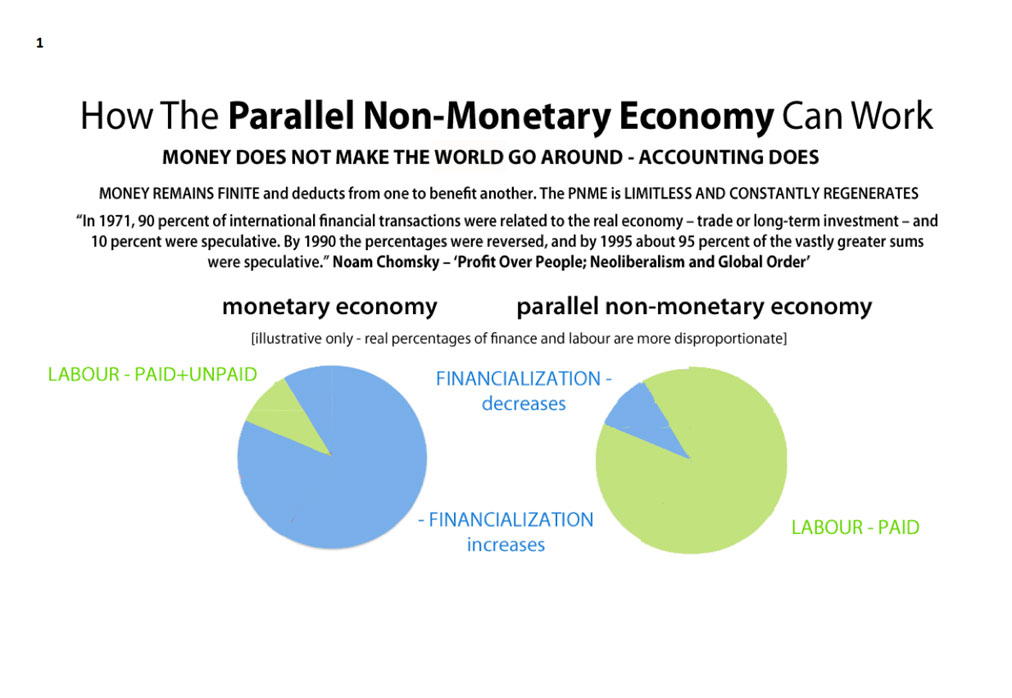
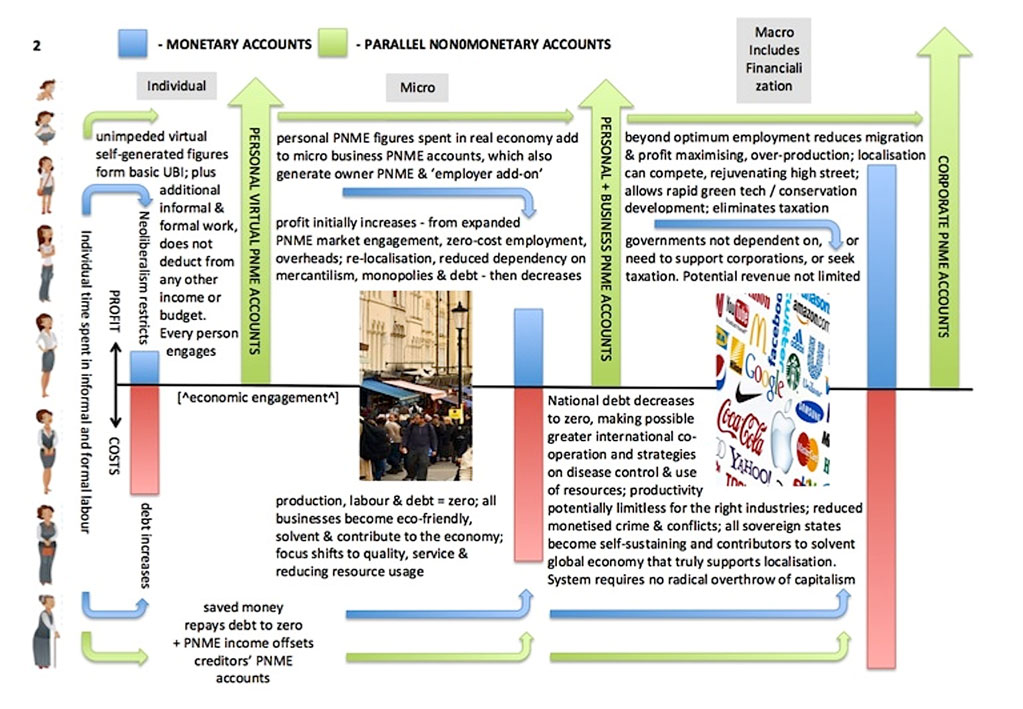
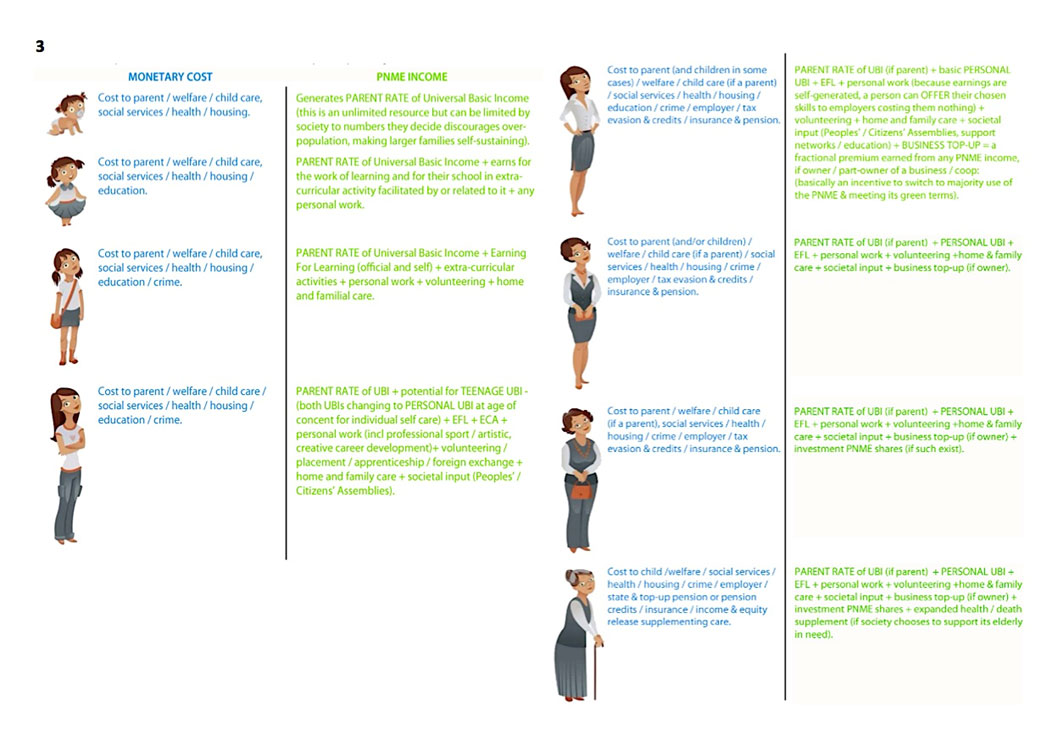
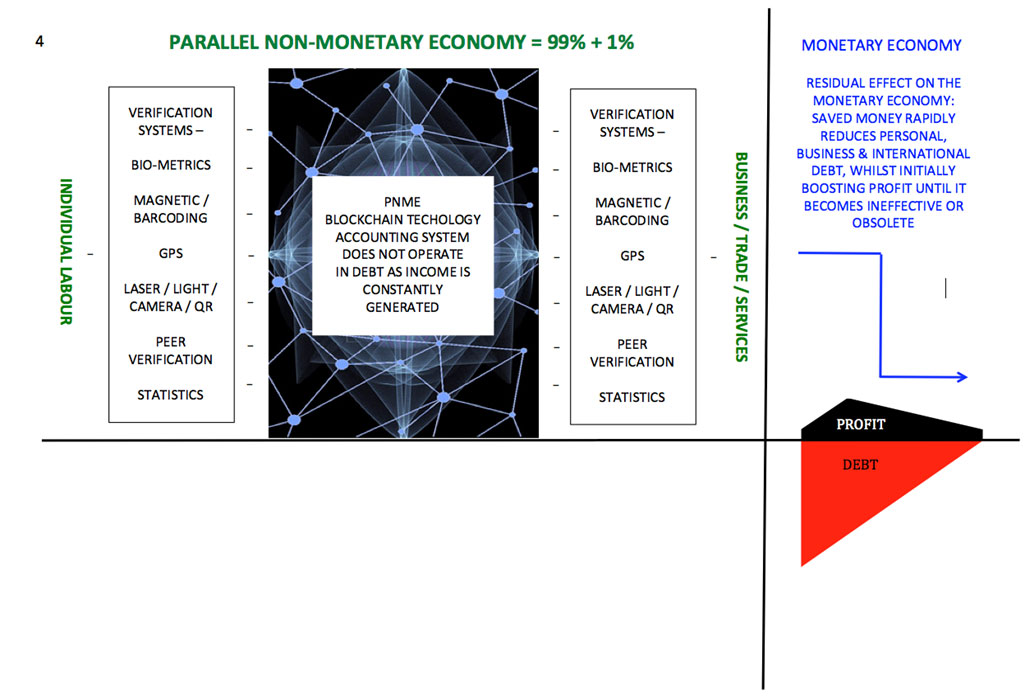
Conclusion
1 – The Parallel Non-Monetary Economy already exists and works, exploited without payment by capitalism.
2 – Forming a collective of scale by the 99% transforms this collective into a market dictating economy (corporations always follow the market).
3 – This does not require any money.
4 – This empowers every individual to have an active, self-generated economic stake in his or her future from an early age onwards.
5 – This empowers collective representation and decision-making dictating politics, rather than corporate agendas.
6 – The is enables people to offer their chosen form of employment (most likely part-time for the agreed PNME rate set by society, or by themselves for specialisation or where resources are scarce) and removes welfare state for those who are incapacitated or limited.
7 – This does not eliminate money but eliminates dependency upon money, reducing monetary power to dictate circumstances.
8 – This can be formed quickly and at scale and enables rapid green industrialisation and resource-based development and production to address climate emergency at greatest speed and scale.
9 – This uses existing technology and systems.
10 – This reduces economic conflict and competition, eliminating debt & poverty; encourages international accord and cooperation.
Finer details and analysis of the PNME can be found in the book ‘A Chance For Everyone: The Parallel Non-Monetary Economy’
(Entails 6 year research of 66 Authors; 649 global networking NGOs, charities, self-sustaining networks, anti-poverty, relief & environmental campaign organisations; political social empowerment and protest movements; NEMs, 70 alternative, complementary, circular and crypto-currencies; non-monetary & free sharing economies). Copyright – Kendal Eaton. (Sounding Off UK Publications 2020).
Document copyright – Kendal Eaton 01 August 2021.
PAPERBACK & KINDLE
UK – US – AU – DE – FR – ES – IT – CA – JA – BR
DOWNLOADS – (FREE or Pay what you wish)
Thanks to Frank Bromley – (Sidney, Australia) for hammering it out from differing perspectives.

Thanks for this. A fascinating option for local economies. This along with Doughnut Economics could kick shit out of the established bankers.
Comment by Tom Wiersma on 12 August, 2021 at 9:35 pmIf there is a set relationship between what studies earn and the amount of studying that corresponds to (say) one apple, then by implication this is still a money system of exchange. Since the difficulty in growing and providing an apple varies over the year (and there may even be times when no apples are available), there must be a way for agreed variable equivalents of studies and apples. So apart from the fact that some persons study better and faster than others and that apples vary in their ease of obtaining them, it would appear that it is much more practical when actual money is introduced instead of a synthetic barter system, which I find is what is being proposed.
Comment by David Harold Chester on 30 July, 2023 at 3:28 pmDue to the need for this kind of exchange an economics system is mandatory and to better understand it a model of the whole social system of macroeconomics follows. This approach turns what was first supposed to be a complex pseudo-science into a simplified and much more exact true science. Read my book and see for yourself–its for free as an e-copy. [email protected]